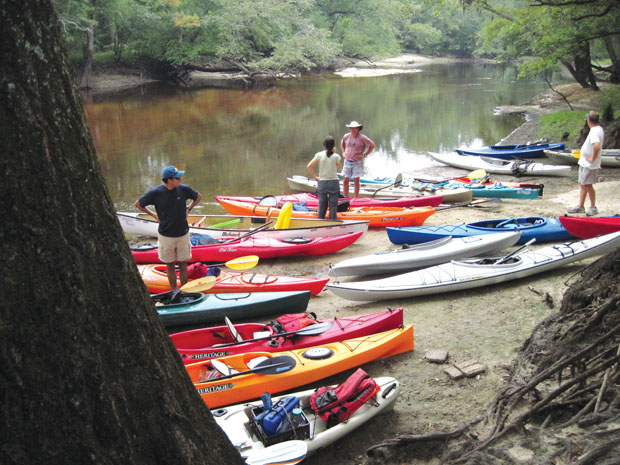The Cape Fear river plays many roles in the quality of life for Wilmington, and luckily there is a local group to help protect its purity
By KIM HENRY

Picture a Carolina blue sky, hear the song of rushing water and imagine paddling along vibrant shores, surrounded by a myriad of diverse plants and wildlife. Welcome to the wonderful world of the Cape Fear River and to the committed individuals whose continual advocacy, education and action protect the water, allowing the wider community to experience its magic. As an important aspect of Wilmington’s identity and heritage, home to intricate eco systems and the drinking water source for 1 in 5 North Carolinians, it’s good news for everyone that the Cape Fear River has an official keeper.
The Riverkeeper - someone whose priority it is to preserve the quality of the water and secure its vitality for everyone and everything that depends on its purity. There are currently around 250 official Riverkeepers worldwide, and Wilmington local Kemp Burdette is one of them. Burdette grew up on the shores of the Cape Fear, canoeing, swimming, and watching the wildlife - average river-side activities if you live in NC. A UNCW graduate, Burdette also holds a master of public administration, and has traveled the world as a US Navy rescue swimmer, a Fulbright Scholar, and a Peace Corps volunteer. On his return to Wilmington in 2008, he worked at Habitat For Humanity before becoming the official Cape Fear Riverkeeper and Executive Director of the non-profit Cape Fear River Watch in 2010.
“Becoming the Riverkeeper was a dream come true. Ensuring that people can continue to enjoy all the beauty and inspiration the river has to offer is an honor,” smiles Burdette, who is clearly more at home by these waters than anywhere else on earth.
The non-profit, Cape Fear River Watch (CFRW) was established back in 1993, and today its membership continues to grow as more and more people take advantage of its prolific calendar of events. On the first Saturday of each month there are river-related educational seminars that cover anything from wild life habitat to conservation methods, and community clean-ups happen every second Saturday at a different location. Regular festivals include lots of children’s activities, encouraging the whole family to enjoy the great outdoors. CFRW even host a monthly paddle where, for a small donation, anyone can get on the water, guided by people who also love and know the river.
“The monthly paddle’s are a great way for people to get to know the river in a safe and comfortable way,” explains Burdette. “The more people are actually out on the river, the more they experience all the many ways it gives to us - as a home to the wildlife, as a source of clean drinking water, and of course, as a huge boost to our quality of life. This empowers people to really understand why it is so important to conserve the river and speak-up on its behalf.”
In addition to nurturing an engaged community, Burdette and his team keep a keen eye on the issues that pose a threat to the river. Advocacy is a major aspect of the groups’ remit. For example, CFRW believes and tirelessly stresses all the reasons why New Hanover County, as the second smallest but also the second most densely populated part of the State, is the wrong place for the proposed Titan Cement facility. CFRW also strive to hold heavy industries accountable for their levels of pollution.
“One of the biggest challenges facing the river today are the industrial scale animal farms - there are more in the Cape Fear watershed than anywhere else in the country, and the largest slaughterhouse in the world is here too. It is essential for the quality of the water that these industries handle their waste in an environmentally responsible fashion,” states Burdette who frequently represents the river’s interests in court. “As a firmly established group and member of the worldwide Waterkeeper Alliance, we have a voice that can be heard. We carry out essential research, demand accountability and communicate relevant information to our ever expanding network of members.”
Gray Jernigan, Staff Attorney for the WaterKeeper Alliance also stressed how important it is to have this channel of communication in place. In the Fall of 2015, there was a move by State officials to re-classify the fastest moving portion of the lower Cape Fear river to a swamp. “The decision to lower the classification of the Cape Fear would potentially give polluters of the river a free pass to negatively impact its water quality. In response to this, Cape Fear River Watch reached out to its members, inviting them to express their indignation about the re-classification and enough letters of objection were consequently submitted to initiate a legislative review of the re-classification, which has put its effective date on hold,” cites Jernigan.
Clearly the role of the Riverkeeper has many branches, and like the smaller tributaries of a river, the varying jobs all lead back to the same source - to honor the river. From facilitating hands-on experience of river-based activities, to empowering the community with educational information and ensuring that river-threatening issues cannot slip under the radar, Cape Fear River Watch may just be one organization that you want to make a part of your New Year’s resolutions.






